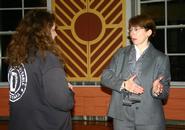
Lt. Col. Margaret Stock, U.S. Army Reserves, provided an informative look at the complexity of immigration issues facing this country in her talk, “Immigration, Citizenship, and Security: The Current Debate” on October 21. Stock framed immigration issues in the context of how they relate to national security, and through her interactive talk helped hammer home the difficulties facing immigration lawyers as they try to deal with this confounding issue.
Stock began the talk with a small exercise. Picking volunteers from the crowd, she had them read small blurbs of passengers stepping off of an international flight in a U.S. airport. She had taken real examples but changed the names to avoid revealing the real identities of the people. She asked, slide by slide, given the circumstances that were provided to the audience, whether it would be wise to send the passengers to a 2nd screening in immigration if they were an immigration officer at a U.S. airport.
The examples used included a Filipino woman who, as it turned out, was trying to sneak into the country using a forged U.S. visa, a Japanese woman who had graduated from an American university, a Russian scientist who was just trying to get to New York City for a day before joining some wealthy Americans on a yacht ride around the world, a Nigerian woman who had paid $40,000 to come to the U.S. with a man using his wife’s passport, Arnold Schwarzenegger, and Mohammed Atta.
For the most part, these examples served to confound the audience, demonstrating the difficulty of being an immigration officer and deciding who looks suspicious given a one minute time frame to make that call.
Having demonstrated the very real every-day difficulties that face U.S. immigration officers, Stock moved on to the topic of her discussion: immigration and national security. She began by citing what had been an oft-repeated comment from the Center for Immigration Studies: “The current terrorist threat to the United States comes almost exclusively from individuals who arrive from abroad.” This was a belief that came into the mainstream after 9/11, and was part of why the Department of Homeland Security was created.
This seems to clash with the national mythology, popularized by Emma Lazarus’ poem about Ellis Island, that this is a country of immigrants. “The national reality is very different than the welcoming people at Ellis Island narrative,” Stock said.
She contended that the post 9/11 shift from a focus on keeping out “intending immigrants,” (people who come to the United States either legally or illegally intending to find a way to stay in the country) to focusing on “security threats,” has not improved the situation. Stock commented that after 9/11, immigration officers have become, “schizophrenic at the border,” meaning that they are so afraid of making a big mistake and letting in the next Mohammed Atta that they have in a way become paralyzed in their job.
Isolationism is not the way to go, Stock maintained. Immigrants are a vital and vibrant fabric in American life. “Our national security depends on our economic security,” she said. If the United States were to stop letting in immigrants, trade and tourism would take very hard hits, the military would lose somewhere between 8,000 and 9,000 new recruits every year, and we would slip farther back in the technological and scientific rat race, among other things, according to Stock.
Stock then focused on the immigration policy philosophy in this country. “Does strict enforcement of our immigration laws make America safer?” she asked. For Stock, it would appear the answer is a resounding no. She used several examples to demonstrate this point, starting with an Iraqi refugee who worked as a teacher of Arabic for the Marine Corps but was barred from joining the Armed Forces. Why? One needs a green card to enlist in the Army, and he couldn’t get one, because anyone tangentially connected to an attempted overthrow of a government is not allowed a green card. The Iraqi in question, was as a member of the Kurdish Democratic Party, thus contributing to an organization that attempted to overthrow a certain Saddam Hussein. The irony was not lost on Stock. This was an example of what she saw as the byproducts of a misguided “strict enforcement” policy.
Stock concluded her talk by voicing her advocacy for the DREAM Act, which would provide temporary green cards to illegal aliens who meet certain criteria, including military service, high school or college degrees. She described it as “750,000 American-educated individuals with good moral character.” Despite having initial bipartisan support as well as support from the Pentagon, the bill was eventually scuttled from a possible vote because some Republicans succeeded in branding it as “amnesty” for illegal aliens. Stock asked, “Isn’t it in our national security to let a good soldier serve instead of deporting him to Mexico?”
The talk concluded with a brief overview of the current immigration debate in the political realm. One camp favors comprehensive reform of the immigration code, similar to Ronald Reagan’s desire in 1984 to fundamentally overhaul the tax code before dealing with enforcement issues. The other side favors “attrition through enforcement,” which, as Stock argues, only serves to perpetuate the constant demonization of many people who don’t deserve the scrutiny.
This talk was made possible by the Security Program of the Arthur Levitt Public Affairs Center.
